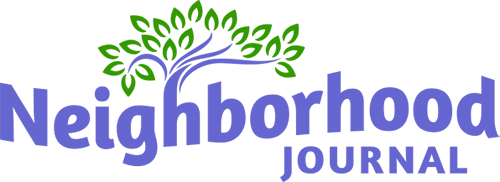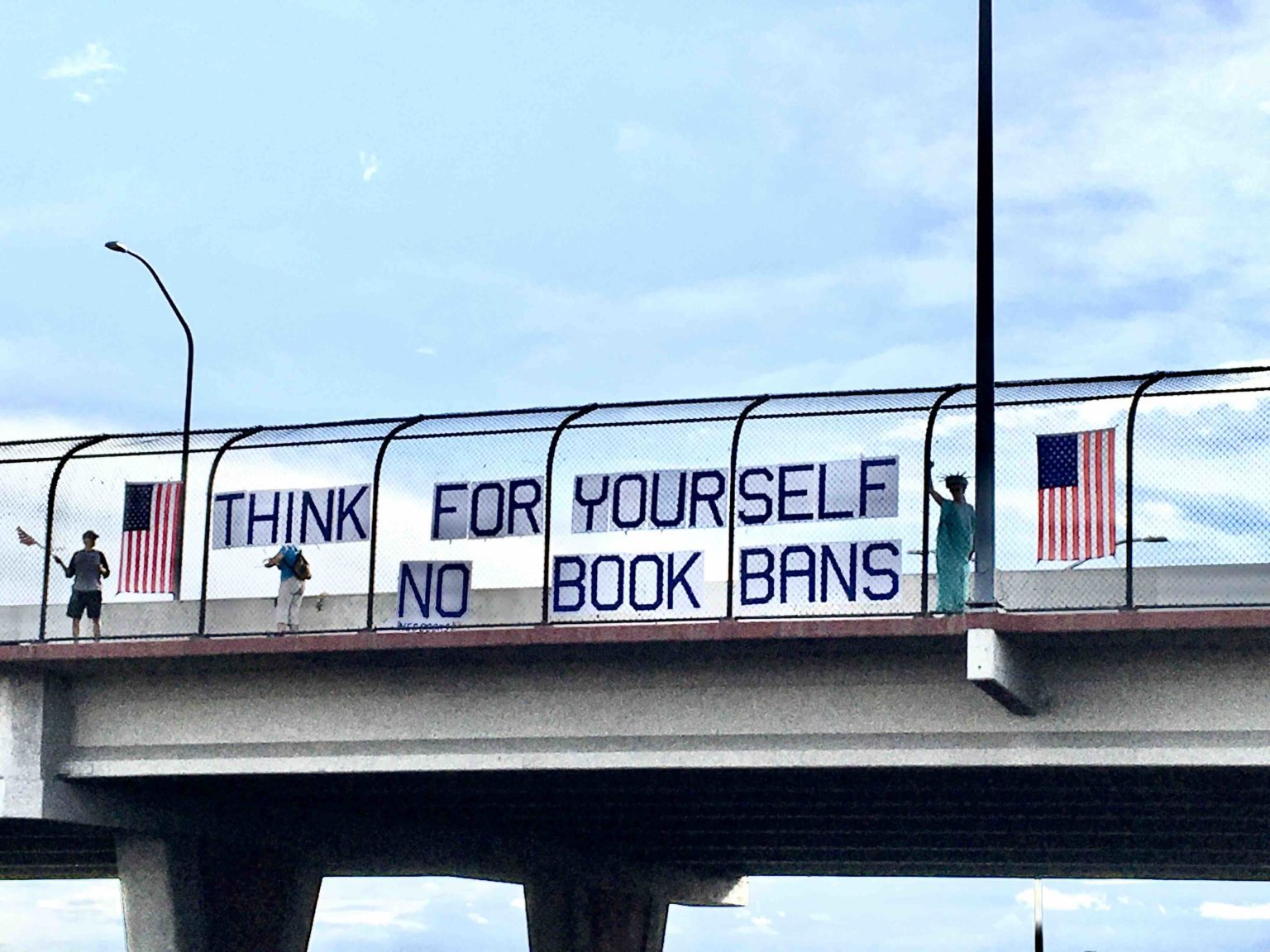From the Jefferson overpass to the Juan Tabo Library, Indivisible Albuquerque has been all over the Northeast Heights promoting intellectual freedom as part of the nationwide Banned Books Week.
On Sunday, Sept. 18, Emilie D’Angelis of Indivisible Albuquerque read a banned book at Erna Ferguson Library. On Monday, Deirdre Caparoso of the New Mexico Library Association Intellectual Freedom Committee gave a presentation at O’Niells Pub on Central. On Tuesday and Wednesday, Indivisible member Guy Montag read “Fahrenheit 451” at multiple libraries on the east side of Albuquerque. And on Thursday and Friday, Indivisible Albuquerque members stood on the Jefferson bridge over I-25 waving American flags next to a large banner that reads, “Don’t Ban Books Ban MAGA Crooks.”
Indivisible Albuquerque board member Paul Szauter explained why it is important to protest censorship and book banning:
“The erosion of freedoms is always incremental. This year, advocates of banning books explain that they are just trying to protect children. Many of the books that they seek to ban give voice to young people who are from marginalized communities. These books are a ray of hope to any young person who feels left out and unwanted.
The problems facing our society are hard. We are not going to be able to deal with them successfully if we exclude large segments of our population from participating in developing solutions.”
Banning LGTBQ+ and race-themed books
This year’s 40th anniversary of Banned Books Week includes events hosted by many different organizations across the country from Sept. 18-24. According to bannedbooksweek.org, the annual event started in 1982 “in response to a sudden surge in the number of challenges to books in schools, bookstores and libraries.”
The site says the event “highlights the value of free and open access to information” and brings “librarians, booksellers, publishers, journalists, teachers, and readers of all types – in shared support of the freedom to seek and to express ideas, even those some consider unorthodox or unpopular.”
Former President Barack Obama even weighed in on the subject, writing a brief statement on the site barackobama.medium.com. Here’s a snippet of what he had to say:
“Today, books that shaped my life – and many others – are being challenged in schools, bookstores, and libraries by people who disagree with certain ideas or perspectives. Often, these ‘banned books’ are written by or feature people of color and members of LGBTQ communities.
This is a mistake. Not only is it important for young people to see themselves represented in the pages of books, but it’s also important for all of us to engage with different ideas and points of view.
At some level, we are all connected. We share a common humanity. If we listen to each other instead of trying to silence certain voices and shut down debate, we can see each other for who we are and maybe even change some minds – or at least agree to live together. If we don’t, we’ll only grow further apart.”
According to PEN America, an organization whose mission is to unite writers and their allies to celebrate creative expression and defend the liberties that make it possible, more books are being challenged in school libraries than ever before.
PEN America’s Index of School Book Bans from July 2021 to June 2022 lists 2,532 instances of individual books being banned. The bans occurred in 138 school districts in 32 states. Of those states, New Mexico had zero bans while neighboring Texas had between 751-1,000 bans during the 2021-22 school year.
According to PEN America’s website, the most banned subject matter includes books with LGBTQ+ themes or who have characters who are LGBTQ+ (41%). The second most banned subject matter includes books where one of the characters is a person of color (40%), followed by books with sexual content (22%), titles with issues of race and racism (21%), titles with themes of rights and activism (10%), biographies, autobiographies or memoirs (9%) and stories with religious minorities (4%).
Providing more access in Albuquerque schools
Although PEN America shows New Mexico has having zero book bans in the 2021-22 time frame, occasionally parents will challenge the literature being used in the classroom. In 2010, a Volcano Vista High School parent asked Albuquerque Public Schools to remove the first book in the “Death Note” series from schools. According to the Albuquerque Journal, that request was rejected by an APS committee made of three APS librarians, an APS official, two parents and a Methodist pastor.
Gerri Barnhart, library/media specialist at La Cueva High School, said the school has never pulled a book from the shelves while working there. “In my 13 year experience as the Librarian/Media Specialist at La Cueva High School, there has never been a complaint about a book from a parent nor have any books been pulled,” Barnhart wrote in response to email questions.
Librarians are often given recommendations by the school, parents and publishers when purchasing books. They have to pick and choose what is appropriate when purchasing material and still stay within their budget, often self-censoring literary content for students.
“I wouldn’t refer to it as ‘self-censoring’ but rather making the best choices to purchase the materials needed and wanted for your school,” Barnhart said. “Each school is different though, and some schools have less money to share with their department than others. There is not a set amount for all libraries; it remains fluid.”
Despite some of the restrictions placed on librarians, there is a transparent process for how books are purchased or removed from shelves. Albuquerque Public Schools even has a form where anyone can recommend a book for purchase by the school district. That form can be found at aps.edu/libraries/book-recommendations-form.
In addition to hard and soft back books found on library shelves, many schools also offer student access to digital collections, which provide even more options to choose from. Public libraries and universities have special collections and offer card holders the option to check out books from other states through the inter-library loan system.
Having access to a wide variety of books is good for many reasons, Barnhart said. “Why is it important to have a wide range of food at the grocery store?” he asks. “People’s tastes vary. It is crucial to have a wide variety of both fiction and nonfiction books available for our students. Do they need a book for a senior science project or for fun and relaxation? We encourage students to read and to explore new concepts; to widen their perspectives of the world around them.”
Szauter agrees it is important for everyone to have access to a wide variety of books with many different perspectives. “Sometimes, most people are wrong about something. Leaders in society sometimes convince a large number of people to believe in something foolish. As long as there are many different voices speaking out, there is a chance that one of these voices outside of the mainstream will advance an idea that displaces the old one,” Szauter said.
As an example, he said the book “Silent Spring” by Rachel Carson, which raised awareness about an insecticide driving the American bald eagle to extinction, was “furiously opposed by industry groups when it was published in 1962” but because of the book, an environmental movement was created that is still active today.
What’s banned and why?
New Mexico State University has a list of banned books it encourages people to read. Some of those books include “The Adventures of Tom Sawyer” by Mark Twain, “A Clockwork Orange” by Anthony Burgess, “Lorax” by Dr. Seuss, and “A Light in the Attic” by Shel Silverstein. “A Light in the Attic”? one may ask. Why? Because, according to NMSU, the poem “How Not to Have to Dry the Dishes” encourages kids to not do the dishes by breaking them, includes violence, is unsuited for the age group, teaches kids to disobey parents, and includes dying children and the presence of supernatural forces.
Another widely challenged book, “1984” by George Orwell, is listed by NMSU as being “banned”
because it is “pro-communist and contains explicit sexual matter.” The book was Orwell’s last work, published in 1949, and deals with issues such as mass surveillance, restrictions on freedom of speech, religion and love. Another one of Orwell’s books, “Animal Farm,” has also been challenged over the years. According to a 2019 display of Orwell’s work at the University of New Mexico, the animated version of “Animal Farm” produced in 1954 was funded by the Central Intelligence Agency “in an effort to encourage the circulation of anti-communist art in the United States.”
It’s a bit ironic that one of Orwell’s works is banned for promoting communism while another was used to promote anti-communist art. No matter the reason for banning books, many would agree that it is an unnecessary prohibition on intellectual freedom and blocks access to important knowledge and information. In Albuquerque, and nationwide, there are many groups and individuals fighting against this unnecessary prohibition, including local librarians, teachers, authors, journalists and groups like Indivisible Albuquerque.
“Indivisible Albuquerque stands with the American Library Association for intellectual freedom. No one should stand between you and your librarian,” Szauter said.
Resources
The following links provide access to books and digital collections from libraries across the country:
Library of Congress: Considered the largest library in the world with more than 167 million items in its collection. It is the official national library of the United States and contains some of the country’s most important documents, including more than 39 million books and other printed material.
New York Public Library: The second largest library in the United States with more than 55 million books and research materials.
New Mexico State Library: Contains a large Southwest collection and provides books by mail.
University of New Mexico Libraries: You don’t have to be a student to browse UNM’s large collection. Stop by one of its libraries to see what they have to offer, including the Center for Southwest Research and Special Collections.
Albuquerque Bernalillo County Public Libraries: Stop by any one of the branch libraries to get a card and start checking out books. Books are easy to renew on the website, where visitors can find an extensive digital collection.
Project Gutenberg: With more than 60,000 free ebooks, Project Gutenberg is the place to find classics by famous authors like Machiavelli, Nietzsche, Hobbes, Plato and more.


